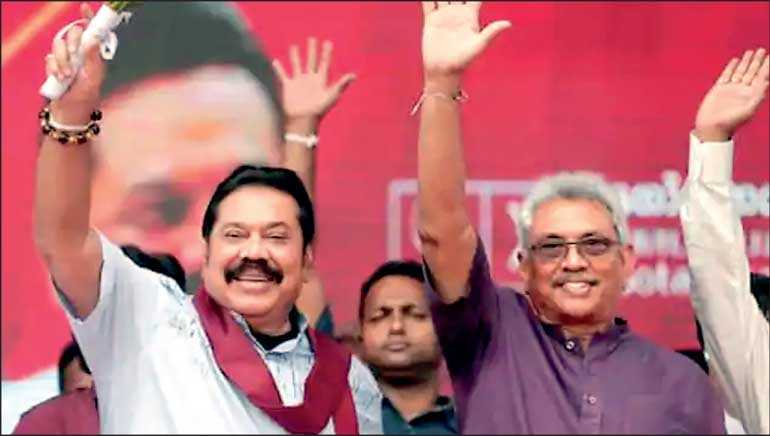Friday Feb 27, 2026
Friday Feb 27, 2026
Saturday, 24 October 2020 00:07 - - {{hitsCtrl.values.hits}}

Firstpost.com: India’s fears of Sri Lanka, under President Gotabaya Rajapaksa, dipping further into Chinese debt seems to be proving true earlier than thought with the country seeking an additional grant of $ 700 million from the China Development Bank.
While this is part of a syndicated $ 1.2 billion loan, Colombo’s decision to continue borrowing from the Chinese amid heightened tensions between India and China, and despite Sri Lanka’s commitment to put “India first,” shows that the island nation’s financial status makes it a somewhat unreliable partner in India’s plans.
Sri Lanka’s decision to seek financial assistance from China is also one of the realities post-COVID that the world has no option but to accept.
Just like every other developing economy in the world, Sri Lanka has been hit hard by the COVID-19 pandemic. According to reports, the coronavirus has not only reversed “more than five years’ worth of progress in improving welfare” in the country, it would push 8.9 lakh more people into poverty.
The World Bank and the IMF have forecast a GDP contraction up to almost 7%. Last month, Moody’s downgraded Lanka’s sovereign credit rating by two notches, pushing the country further down in the “very high credit risk” category, saying the South Asian nation would be hard-pressed to secure funding to service its huge foreign debt.
According to a Reuters report, Sri Lanka has debt payments amounting to $ 3.2 billion between July and December. Going by these figures, and the Central Bank of Sri Lanka’s recent announcement that the country settled $ 1 billion in international sovereign bonds (ISB) earlier this month, it still leaves the country with a debt of $ 2.2 billion to be paid by the end of the year. And even if Sri Lanka somehow manages to pay that debt by the end of 2020, the country will have a daunting $ 4.5 billion loan to pay next year around July.
As per a Nikkei Asia report, the ultra-nationalist government in power in Sri Lanka desperately needs cash to service over $ 15 billion owed to foreign creditors, while its overall foreign debt is even higher at $ 50.8 billion. Meanwhile, after the September pay-out, its foreign reserves have shrunk to $ 6.4 billion.
“In different times in world history, different countries have been the ones who have had the most amount of cash. And now it happens to be China, so China will naturally invest all over the world. I think we should all respect that,” said Sri Lankan State Minister of Finance Ajith Nivard Cabral, who is also a former governor of the Central Bank of Sri Lanka.
The $ 700 million that Sri Lanka is seeking from the China Development Bank is part of a syndicated $ 1.2 loan, of which it has already received $ 500 million earlier this year.
According to Cabraal, Sri Lanka is exploring several options to repay its debt, including additional loans from China, currency swap facilities with India and China, and Samurai and Panda bonds.
While the Samurai bonds are Japanese Yen-denominated bonds sold by a non-Japanese issuer in Japan, Panda bonds are Chinese renminbi-denominated bonds sold by a non-Chinese company in China. Most recently Indonesia had raised $ 930 million in Samurai bonds to help the government cover the fiscal deficit and fund the coronavirus pandemic response.
Note that neither the IMF nor the World Bank features in Sri Lanka’s plans to repay its huge debt.
The Rajapaksas are known to be pro-China – it was during the second Presidential term of Mahinda Rajapaksa, the elder brother of current president Gotabaya Rajapaksa, that “Colombo allowed China to freely spread itself out in Sri Lanka,” including allowing a Chinese military submarine and a PLA warship to dock in the Colombo harbour ignoring India’s concerns – according to the Nikkei Asia, a major reason for the Rajapaksa’s going to China and not the IMF or World Bank, is because both the IMF and the World Bank are seen as having “imperial and colonial” trappings.
Even though local analysts say that the IMF may be the best option for the debt-ridden country, and could put the country on a sustainable path and make its bonds more attractive, the global lender’s poor track record is hard to ignore.
“Part of Sri Lanka’s political tradition views the IMF with suspicion, and going to it is presented as having a negative outcome,” Nishan De Mel, executive director of Verite Research, a Colombo think tank, told Nikkei Asia.
And that’s why soon after the Rajapaksa government came to power in 2019, it abruptly ended discussions on a $ 1.2 billion loan from the IMF started by the previous Maithripala Sirisena-led govt.
According to an AIDData.org database of China’s investments made with a diplomatic investment, as of 2017, China has invested $ 12.88 billion in Sri Lanka, the second highest in the Indian Ocean Region after Pakistan ($ 38.87 billion). Bangladesh follows closely with $ 10.51 billion in assistance.
Another reason Sri Lanka may be choosing to borrow from China rather than the IMF or World Bank, is western lenders’ reluctance in financing infrastructure projects. According to a Brookings report, in the past around 70% of World Bank financing used to be utilised for economic infrastructure, that figures now stands at around 30%.
The Chinese creditors currently account for 10% of Sri Lanka’s total foreign debt of $ 50.8 billion, and most of their investments are in large infrastructure projects over the last few decades.
The fact is, given the current political environment and the post-Pandemic realities, Sri Lanka borrowing from China is a reality India will have to accept. All New Delhi can hope for is that next time the Chinese come to collect, Sri Lanka doesn’t give up another portion of its sovereign territory, further strengthening China in India’s backyard. (https://www.firstpost.com/india/sri-lanka-borrowing-from-cash-king-china-a-post-pandemic-reality-india-must-accept-8941991.html)